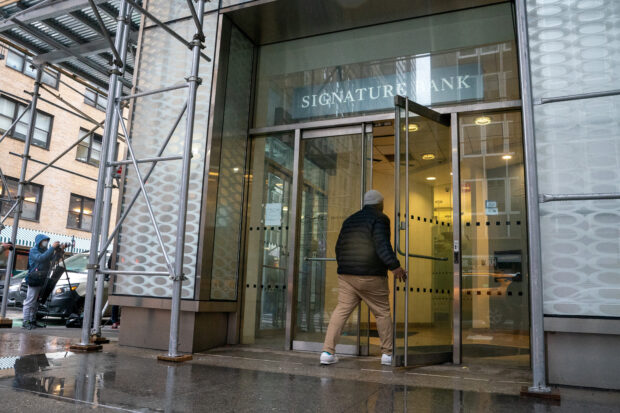Buyers sought for Signature Bank’s $33-B CRE portfolio

A person walks into a Signature Bank branch in New York City, U.S., March 13, 2023. REUTERS/David ‘Dee’ Delgado
WASHINGTON -The U.S. Federal Deposit Insurance Corporation (FDIC) is seeking buyers for the $33-billion commercial real estate (CRE) loan portfolio of failed New York lender Signature Bank, it said on Tuesday.
The majority of the portfolio comprises multi-family properties primarily located in New York City, the regulator said, adding that it would be marketing the asset over the next three months.
The FDIC has been seeking to sell off portions of Signature, one of three larger banks that failed in the spring, since the bank was closed in March after an exodus of depositors seeking higher returns and safer institutions.
READ: Regulators close New York’s Signature bank, say depositors will be made whole
Later that month New York Community Bancorp agreed to a deal with the FDIC to buy most deposits and certain loan portfolios along with all 40 of Signature’s former branches.
Within the CRE portfolio is about $15 billion of loans secured by residences that are rent stabilized or controlled.
While the commercial real estate industry has been under pressure amid rising rents and lingering office vacancies, Signature Bank’s portfolio is relatively attractive, said Matt Pestronk, president and co-founder of Post Brothers, a real estate developer based in Philadelphia.
READ: FDIC announces deal to sell Signature Bank assets to New York Community Bancorp
“The FDIC sale is somewhat unique as it has a large concentration of rent stabilized properties as collateral for the loans,” he said. “Even in this environment there are buyers of rent-stabilized buildings and lenders who make loans on them, because if the underlying properties are valued at cap rates near today’s interest rates, they would be very safe investments to own as a loan or as real estate in the case the loans are not performing.”
Since the FDIC has a legal obligation to preserve existing affordable housing for lower-income people, the agency said it planned to place all those loans within joint ventures in which FDIC would retain a majority equity interest.
Any winning bidders for those ventures would be responsible for managing and servicing the loans but would have to meet certain requirements to preserve the loans and underlying collateral, the FDIC said.
New York City and State housing authorities, as well as community groups, are providing input to the FDIC as it begins marketing. The FDIC said it expects to complete any portfolio sales by the end of 2023.